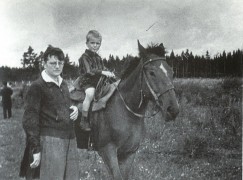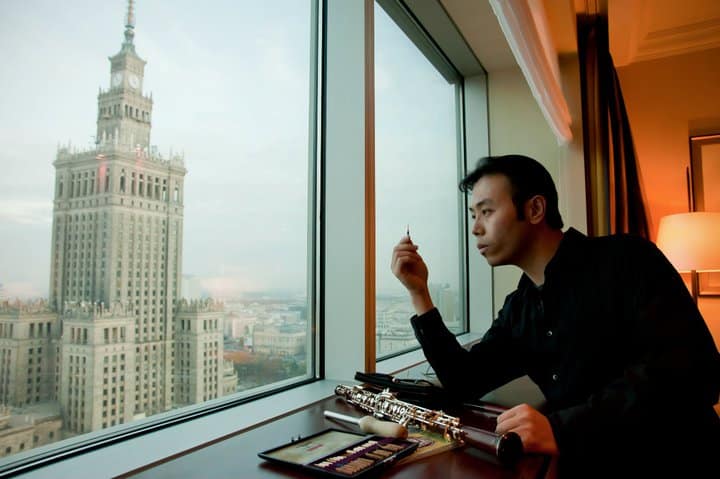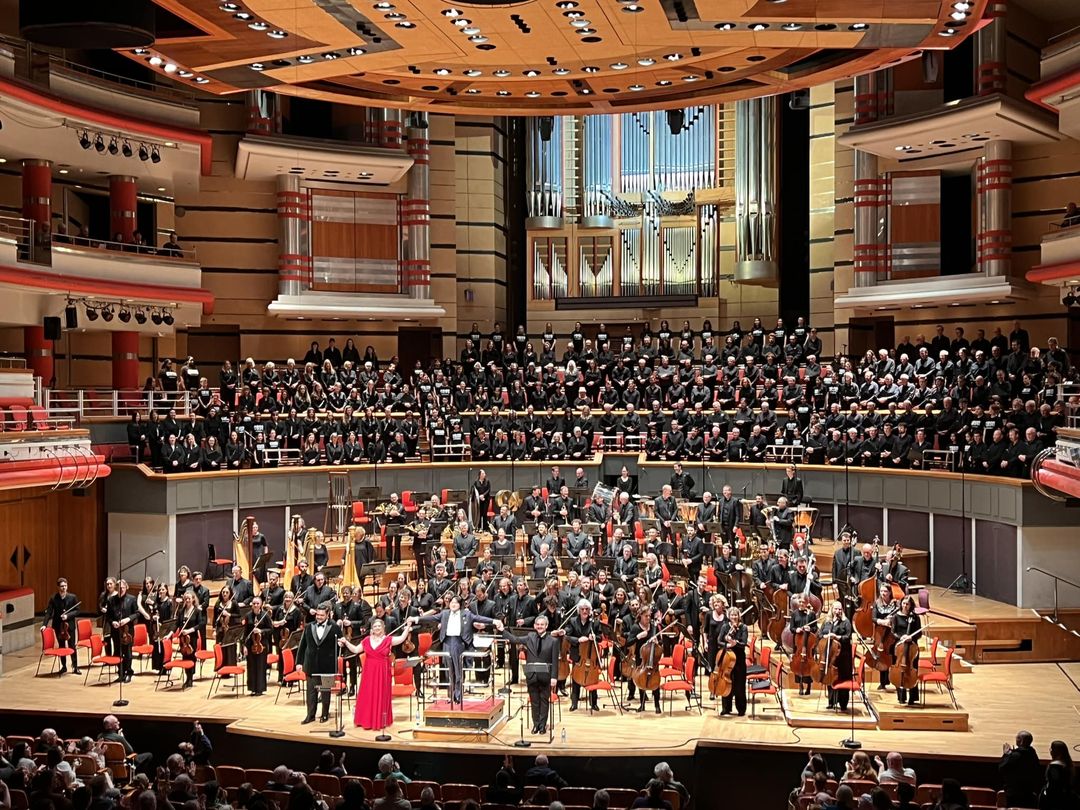The Shostakovich family endorses Solomon Volkov
NewsClearing out some books the other day I came across a note, sent to me by Solomon Volkov. It contained an introduction, written by Galina and Maxim Shostakovich, for the 2006 Russian edition of Volkov’s book, Shostakovich and Stalin.
The final paragraph reads as follows:
‘We, Shostakovich’s children, who watched his life pass before our eyes, express our profound gratitude to Solomon Volkov for his marvelous work, the naked truth of which will undoubtedly help our contemporaries and future generations better to see the difficult fate of our unforgettable father and, through it, better to understand his music.’ (transl. Antonina W. Bouis)
This warm endorsement flies in the face of the claim by Richard Taruskin and his followers that the Shostakovich family regarded Volkov as ‘dishonest’ and an impostor over his shostakovich memoir, Testimony. If there was dishonesty in the war over Shostakovich’s legacy, it was on Taruskin’s side. As time passes and Taruskin fades, Volkov emerges more and more as the bearer of truth.
That he earned the wholehearted gratitude of Shostakovich’s children is a fact unadmitted by Taruskin or the New York Times, who waged a relentless witch hunt against Volkov.






It would be important for the entire introduction to be translated and published in a musicology and/or literary journal.
Any characterization of the “Shostakovich family” that omits his widow, Irina, is not a particularly honest one. This is what she had to say about Solomon Volkov: https://archive.nytimes.com/www.nytimes.com/library/books/082000shostakovich-memoirs.html
Toldja.
https://www.reddit.com/r/classicalmusic/comments/zol6xr/testimony_and_the_shostakovich_wars/
“In 1986, the composer’s son Maxim told the BBC, “It’s true. It’s accurate. Sometimes, for me, there is too much rumour in it, but nothing major. The basis of the book is correct.” It must be noted, Maxim has not been absolute in his praise of Volkov and Testimony. While in the Soviet Union, he had first claimed Testimony was “…a book about my father not by my father.” In 1991, in an interview in Gramophone, he told musicologist David Fanning, “I would still say it’s a book about my father, not by him. The conversations about Glazunov, Meyerhold, Zoshchenko are one thing. But it also contains rumours, and sometimes false rumours.” Yet in the same interview he would add, “…the political tendency, the political opinions of my father are represented correctly.” Maxim also fully endorsed Ian MacDonald’s anti-revisionist biography The New Shostakovich (in which MacDonald firmly takes Volkov’s side), calling it “One of the best biographies of Dmitri Shostakovich I have read.” While Maxim’s endorsement of Testimony may not be as categorical as some would prefer, he is undoubtedly on the revisionist side of the argument.
Others are less equivocal. In an interview with Ho and Feofanov in 1996, Shostakovich’s daughter Galina endorsed the memoirs, stating, “I am an admirer of Solomon Volkov. There is nothing false there. Definitely the style of speech is Shostakovich’s – not only the choice of words, but the way they are put together.” Free from Soviet control after his emigration in 1977, legendary conductor and esteemed Shostakovich interpreter Rudolf Barshai simply told the BBC in 1983, “It’s all true.” Conductor Kirill Kondrashin endorsed the authenticity of the memoirs at a symposium in September 1980, adding, “We may now speak of a renaissance of Shostakovich in the West, since the facts of his life have become known here as well and have forced people to look at his music with new eyes.”
This exact quote from Maxim Shostakovich has been in the English Wikipedia article for ages. His support for it is not unknown.
en.wikipedia.org/wiki/Solomon_Volkov
Solomon Volkov’s dishonest opportunist. Richard Tarushkin’s a finest musicologist of our time. We laughed that SV wrote a book fighting RT. What a coward! RT past this year and I miss to converse with him.
Speaking as a scholar on Russian music, there is far more to it than this. People need to examine the wider picture before making a judgement. Other sources – to the contrary – also exist.
From Wikipedia: “Maxim also was the guest of honor at the launching of the Czech edition of the memoirs in 2005 and, with his sister Galina, contributed an introduction to the second Russian edition of Volkov’s Shostakovich and Stalin in 2006, which includes the following: “We, Shostakovich’s children, who watched his life pass before our eyes, express our profound gratitude to Solomon Volkov for his marvelous work, the naked truth of which will undoubtedly help our contemporaries and future generations better to see the difficult fate of our unforgettable father, and through it, better to understand his music.”
Norman, I may have already posted in the past that Maxim Shostakovich told me c.1984 that Volkov’s book was essentially true- This was in Ottawa after he conducted the National Arts Centre Orchestra. He was generally morose until after the post concert dinner. It had snowed while we dined and when walking back to the car he was suddenly transformed, starting a snowball fight, giggling like a child.
Lovely memory, Costa.
Thanks for this Costa.
I was the Principal Trumpet on that concert which included Shostakovich’s 9th Symphony. I remember the intensity with which Maxim rehearsed in his effort to achive the style in which he felt it should be played. Up to this point our repertoire had been largely German.
He also corrected two misprints in the brass. There was a wrong note in the trumpet solo and an incorrect rhythm in the trumpets and trombones; both in the Presto.
It’s almost a metaphor for the negative reception of Volkov’s book that I’ve been generally unsuccesful in convincing my colleagues in other orchestras that despite the printed score and parts there are these two misprints.
Well, what are these misprints? The score and parts consist of thousands of symbols and it would be helpful to the rest of us for you to share your information.
In the second bar of #58 the second note of the triplet should be an A naturel not a B natural. In the New York Philharmonic’s archival of scores Bernstein has it penciled in as an A natural with a question mark above the note. He did not however correct the rhythm in the brass in the third bar after #60 which should be two eight rests and the sf note on the third triplet , same rhythm as the next two.
Great. Thank you for your clarification!
Lovely to read this, “P”. Hope you and your family are well. All best
My message below was
meant for you, “P”. Greetings
my replies to you, Been there done that, get shoved below
Taruskin was a bully who trained other bullies. In spite of some good achievements, he harmed musicology as a whole. (Not that THAT was very difficult …)
OF COURSE “Testimony” rings true. Our current knowledge of the Stalin era – and Shostakovich’s ‘awkward’ (and dangerous) relationship with Stalin – clearly validates it. It also fully explains why the 4th symphony is what it is.
There are good reasons why academic musicologists and other scholars have been sceptical about Volkov’s Testament. The original notes of his interviews with Shostakovich are not extant, and therefore potentially available for inspection, having reportedly been lost. Also the original typescript of the book is not available for inspection, having been sold to a private collector in the 1990s. The chain of evidence between Volkov’s interaction with Shostakovich and the appearance of Testament is therefore very shaky. Furthermore, it is Volkov himself who was responsible for that, because he didn’t take care to make his original materials available to others. That was quite remarkable, in view of what was at stake for his reputation, as he must have known or guessed. He was therefore either covering his tracks, or had been extremely careless about preserving source material. By any standards of historical scholarship he has no grounds for complaint against those who are sceptical of his work. And it is very difficult for historical or musicological scholars to take seriously somebody who was so cavalier about the transmission of his original research materials. When combined with the statements by Shostakovich’s widow that Volkov’s contact with her late husband had been rather limited, and Laurel Fay’s discovery that the beginning of each chapter closely resembles previous articles by Shostakovich, there are good grounds for doubting the authenticity of Testament. The fact that Shostakovich’s children expressed support for Volkov’s book is open to the objections that (i) they had a vested interest in anything which might mitigate their father’s collaboration with the Soviet authorities (which was very understandable in the circumstances of his time), and (ii) the preservation and confirmation of evidence is everything in historical research. Arguments relating to the difficulty of getting material out of the Soviet Union or relating to Volkov’s departure from the USSR in 1976 are beside the point. Evidence is evidence. It either exists or it doesn’t. The most charitable verdict on Testament is probably the Scottish ‘Not proven’. But it is difficult to avoid less charitable interpretations. Should Volkov’s original notes resurface, and should the owner of the transcript make it available for study, the sceptics might well have to change their minds. But as things stand, scepticism must prevail.
Well put! Thank you!
Thanks, Dr Wilson, especially since this is your area of expertise (in which I am essentially an onlooker).
DSCH’s life was horror in so many ways. Volkov’s work brings clarity to us. His music would not be understood without that understanding. Thanks to Volkov – and DSCH.
I became Resident Conductor of the New Orleans Symphony at the start of the 1986-87 season, the same year that Maxim Shostakovich became its Music Director. I vividly remember the first time I mentioned Solomon Volkov’s TESTIMONY to Maxim. He bristled, pointed to the book and said “Don’t believe all of it. It’s not all true.” I didn’t mention Testimony for a while but after I got to know Maxim better and when I was assigned to interview him in front of an invited audience after dress rehearsals for Classical subscription concerts, I mustered the nerve to ask him about specific excerpts I’d earmarked in my copy. These were always passages relevant to whatever Shostakovich piece he was conducting for that concert – this included the 6th, 9th, 10th Symphonies as well as works inspired by tragic events in Russia, particularly the 13th Symphony (Babi Yar) and “The Execution of Stepan Razin”. Time after time, when I would read the excerpt from Testimony, he would say “Well, that is true — not all of book is true, but that is!” Never once did he disagree with a quoted passage from Volkov. As I got to know Maxim better, my sense was that he had been very close to his father and that he resented Volkov putting forth a book about someone that he couldn’t have known as well as Maxim did. I think this must be an understandable reaction from anyone who adored his father as Maxim did — that no one could have portrayed him in the same way that only he and sister knew his father.
In Maxim’s case, not only did he see Dmitri Shostakovich’s personal life examined under Volkov’s lens, but Maxim was a conductor to whom his father passed on details of his music beyond the printed score. As the Trumpeter above commented, I also remember being backstage with my score to the 9th Symphony. Maxim grabbed my score and quickly penciled in changes in articulation to some of the string passages – he said “This is what Papa really wanted but he couldn’t get the changes in before it was published.” Of course, I’ve made those changes to the orchestra parts whenever I’ve conducted the 9th. As I’m sure many musicians would agree, Shostakovich’s music took on a different sound and character when Maxim conducted. The New Orleans Symphony put forth a brilliance, a clarity, and often a bite and edginess when Maxim conducted his father’s music that no other conductor could possibly elicit. I feel privileged to have had this connection to the music of Shostakovich though my close relationship with Maxim.
I remember Maxine’s reaction to “Testimony” when I brought it up at about the same time. It was somewhat “luke warm.” I got the feeling that he didn’t want to talk about it.